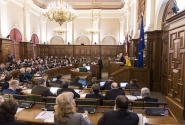
On Thursday, 22 January, at the annual foreign policy debate held at the Saeima the focus was on the current security challenges faced by the European Union, as well as the opportunities provided to Latvia during its Presidency of the Council of the European Union. It is the fifth consecutive year that a debate is held on what has been accomplished and what is planned in the realm of foreign and EU policy.
In his address, Ojārs Ēriks Kalniņš, Chairman of the Foreign Affairs Committee, emphasised that our main current foreign policy priority is to ensure the security of Latvia’s inhabitants. “Threats to our internal and external security, as well as our economic and social security, are interrelated. They demand a complex solution. We have to continue increasing our defence budget up to 2% of GDP; however, the main instrument for addressing this problem is diplomacy,” said the Chairman.
Chairman Kalniņš also highlighted another great challenge, namely, the situation in eastern Ukraine: “Russia’s aggression in Ukraine and annexation of Crimea are unprecedented challenges to international security, order and the rule of law. There is no doubt about that because this situation has caused serious security threats to Europe as a whole and Latvia in particular.” He also stressed that an equally serious threat to world peace and security is posed by international terrorism, which reminded us of its existence two weeks ago in Paris.
Ojārs Ēriks Kalniņš indicated that cooperation is the key to strengthening our security, as well as a way to prevent threats and open up opportunities; through cooperation we can explore new markets and facilitate economic growth. Among the largest cooperation partners, the Chairman mentioned the EU and NATO member states, as well as countries of the Baltic Sea region, the Eastern Partnership and Central Asia.
In his address, Ojārs Ēriks Kalniņš indicated that the Latvian Presidency is a great opportunity for Latvia’s foreign policy, and he referred to Federica Mogherini, High Representative of the Union for Foreign Affairs and Security Policy, who indicated that our broad perspective in all geographical directions and consensus-oriented diplomacy are major advantages of our Presidency. The Chairman also noted that Latvia’s foreign policy has remained consistent, reasonable and balanced during the previous challenge-filled year and that if we continue this approach, we will be able to respond to challenges and take advantage of opportunities in order to protect the security of our state and promote our national interests.
Lolita Čigāne, Chairperson of the European Affairs Committee, also focussed on challenges that Europe is currently facing in the areas of employment, attracting investments and security. “Russia’s military aggression in Ukraine, as well as the military expansion of Islam fundamentalists in Iraq, Syria and Libya, has almost simultaneously caused great instability and tensions in both the east and the south of the European Union. Furthermore, the tragic acts of terrorism in Paris on the first days of the Latvian Presidency have, in a sense, become Europe’s equivalent to 11 September; once again this highlights the need to keep the fight against extremism on the EU’s agenda,” said the Chairperson. She also emphasised that in light of these challenges the European Union has to review its Neighbourhood Policy and, if necessary, reform it in order to make it more effective.
At the same time, Lolita Čigāne said that this is why both of the most significant regional cooperation policy tools of the European Union - namely, the Union for the Mediterranean and the Eastern Partnership - will be in the spotlight of several interparliamentary events organised by the Saeima during the Latvian Presidency
Chairperson Čigāne also indicated that maintenance of unity is an equally significant challenge for the European Union. “The unprecedented well-being and success of the European Union for half of a century has been based on the ability of its member states to reach joint solutions to economic challenges, and the same should apply to the Common Foreign and Security Policy of the European Union. The European Union is globally strong while it is united.”
In her address, Lolita Čigāne stressed that the Latvian Presidency has to fulfil its obligation of solidarity to the European Union. “It is said that true political maturity is achieved by an EU member state during the six months of its presidency - during this period the state becomes a true and mature EU member state. During our six-month Presidency we as a state, including the Saeima, will grow as well because now as Latvia leads the work of the Council of the European Union it speaks on behalf of the entire Union in numerous international formats,” said the Chairperson. Lolita Čigāne also indicated that so far the Saeima has been very closely involved in Latvia’s activity on the EU level through its European Affairs Committee; that is, the European Affairs Committee approves national positions before they are presented at the Council. During the Latvian Presidency, however, the Committee will also approve the EU’s most significant legislative initiatives which will be considered during this half year.
The foreign policy debate is streamed live on the Saeima website www.saeima.lv, and a transcript of it is prepared. Transcript and audio files of the sitting are available at the Saeima website (in Latvian) http://ej.uz/27vi.
Before the debate, Edgars Rinkēvičs, Minister for Foreign Affairs, presented a report on Latvia’s accomplishments and planned future activities in foreign and EU policy.
Pursuant to the Rules of Procedure of the Saeima, not later than by 16 January, the Minister for Foreign Affairs must submit to the Saeima the annual report on the performance and planned future activities in foreign policy which has been approved by the Prime Minister. This report must also contain information on activity regarding EU affairs.
The first foreign policy debate was held at the Saeima on 27 January 2011.
The annual report of the Minister for Foreign Affairs on country’s accomplishments and planned future activities in foreign and European Union policy is available at http://ej.uz/hd58.
Saeima Press Service







